|
Series:
Prominent
Zarathushtis
Author:
Godrej N. Dotivala
Subtopics:
Reference:
Related
Articles:
Related
Links:
|
In
the celestial galaxy of Indian politicians Sir Pherozshah Merwanjee Mehta,
K.C.I.E., M.A., LL.D., Bar-at-Law, held the exalted station of Helios, the
omnipotent orb of fire, round which revolved the constellations-his
contemporaries.
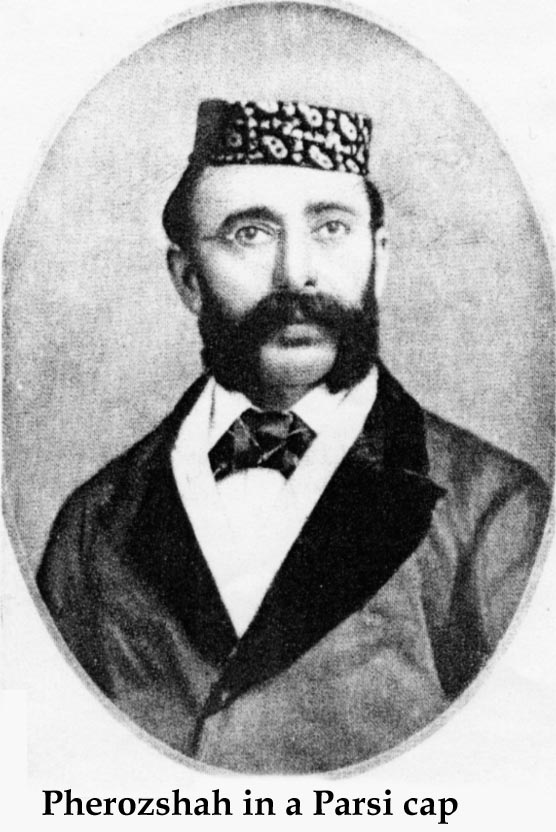 Born
in Mumbai on 4th August 1845 with the proverbial silver spoon in his mouth;
liberal education was his for the asking. Graduating from the Elphinstone
College in 1864 he passed the M.A. examination, with honors, six months later,
being the first Parsi to have obtained a Master's degree.
Having attained the acme of academic distinction in our country he
proceeded to England in order to specialize in Law.
The exhilarating and ennobling atmosphere of English 'Versity life had a
stimulating influence upon his formative mind. He attended meetings of the
London Indian Society and the East India Association and there formed lasting
friendships with half-a-dozen students who later rose to positions of
pre-eminence-J.N. Tata, Mun Mohan Ghosh, Budruddin Tyabjee, W.C. Bonnerjee,
Hormasjee Wadia and Jamsetjee Cama. But the most inspiring contact of all was
with his political "guru” Dadabhai Naoroji. Born
in Mumbai on 4th August 1845 with the proverbial silver spoon in his mouth;
liberal education was his for the asking. Graduating from the Elphinstone
College in 1864 he passed the M.A. examination, with honors, six months later,
being the first Parsi to have obtained a Master's degree.
Having attained the acme of academic distinction in our country he
proceeded to England in order to specialize in Law.
The exhilarating and ennobling atmosphere of English 'Versity life had a
stimulating influence upon his formative mind. He attended meetings of the
London Indian Society and the East India Association and there formed lasting
friendships with half-a-dozen students who later rose to positions of
pre-eminence-J.N. Tata, Mun Mohan Ghosh, Budruddin Tyabjee, W.C. Bonnerjee,
Hormasjee Wadia and Jamsetjee Cama. But the most inspiring contact of all was
with his political "guru” Dadabhai Naoroji.
In
the course of his multifarious activities Pherozshah delivered an exceedingly
informative and thought-provoking address on "The Educational System of
Mumbai" before the members of the East India Association. On being called
to the Bar in 1868 Mehta returned to India and found to his utter chagrin that
the legal profession was the exclusive preserve of a handful of formidable
British barristers. But, an intrepid spirit such as Pherozshah's could not
hibernate in the wilderness indefinitely. With his forensic ability and able
advocacy he forged ahead and soon was in the forefront of Mumbai's legal
luminaries. His fame at the local Law Courts spread further afield and briefs
poured in from all parts of Gujarat and Kathiawar, like a perpetual stream of
'milk and honey'.
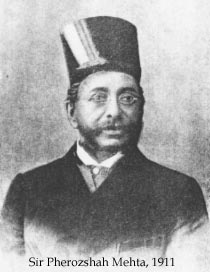 Pherozshah's
Municipal career commenced in the early seventies of the 19th century under
circumstances which could hardly be regarded as auspicious. Completely
overlooking the innumerable benefits that had accrued from the Crawford
administration, the citizens of Mumbai trooped into the Framji Cowasji Hall one
fine day and heard speaker after speaker denounce the Commissioner for
recklessly squandering away Municipal funds. This uproar turned out to be a
blessing in disguise for India's enfant terrible.
Mehta's spirited defense of Mr. Arthur Crawford vindicated that great
public servant's honor and his eloquent plea for municipal reform was later
embodied in the Act of 1872. When this enactment was later amended Mehta was
again the prime sponsor. The public with one voice hailed this ratified
Municipal Act of 1888 as a Magna Carta of their civic rights. By this Act
Pherozshah established the Corporation as "the ultimate tribunal whose
decision must be final and binding" in all matters relating to the internal
administration of the City. Thus, he became the father of Mumbai's Municipal
Charter, founder of its glorious civic traditions and the Corporation's trusted
guide and mentor. The 'City Fathers' had implicit faith in his prudent
leadership and elected him president on no fewer than four occasions- 1884,
1885, 1905 and 1911 - an achievement unique in the annals of this august body.
What Joseph Charnberlain was to Birmingham, Pherozshah Mehta was to Mumbai. To
his untiring efforts and inspiring guidance Mumbai is indebted for its position
as the Urbs Prima in India. Pherozshah's
Municipal career commenced in the early seventies of the 19th century under
circumstances which could hardly be regarded as auspicious. Completely
overlooking the innumerable benefits that had accrued from the Crawford
administration, the citizens of Mumbai trooped into the Framji Cowasji Hall one
fine day and heard speaker after speaker denounce the Commissioner for
recklessly squandering away Municipal funds. This uproar turned out to be a
blessing in disguise for India's enfant terrible.
Mehta's spirited defense of Mr. Arthur Crawford vindicated that great
public servant's honor and his eloquent plea for municipal reform was later
embodied in the Act of 1872. When this enactment was later amended Mehta was
again the prime sponsor. The public with one voice hailed this ratified
Municipal Act of 1888 as a Magna Carta of their civic rights. By this Act
Pherozshah established the Corporation as "the ultimate tribunal whose
decision must be final and binding" in all matters relating to the internal
administration of the City. Thus, he became the father of Mumbai's Municipal
Charter, founder of its glorious civic traditions and the Corporation's trusted
guide and mentor. The 'City Fathers' had implicit faith in his prudent
leadership and elected him president on no fewer than four occasions- 1884,
1885, 1905 and 1911 - an achievement unique in the annals of this august body.
What Joseph Charnberlain was to Birmingham, Pherozshah Mehta was to Mumbai. To
his untiring efforts and inspiring guidance Mumbai is indebted for its position
as the Urbs Prima in India.
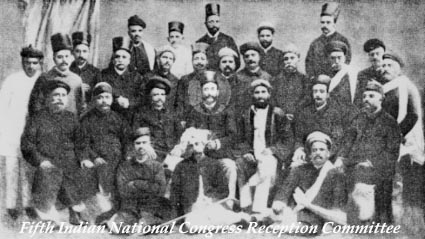 Despite
these preoccupations he was not indifferent to problems of national importance.
The Viceroyalty of Lord Lytton was notorious for its many short-sighted policies
and acts of recrimination. But of them all, the most reprehensible was
unquestionably the Vernacular Press Act. Pherozshah could not tolerate this
blatant encroachment upon the Freedom of the Press and categorically protested
against this repressive reactionary measure. Despite
these preoccupations he was not indifferent to problems of national importance.
The Viceroyalty of Lord Lytton was notorious for its many short-sighted policies
and acts of recrimination. But of them all, the most reprehensible was
unquestionably the Vernacular Press Act. Pherozshah could not tolerate this
blatant encroachment upon the Freedom of the Press and categorically protested
against this repressive reactionary measure.
There
cannot be a shadow of doubt as regards his political affinity. He was out and
out a "moderate" with pronounced liberal leanings.
In 1885 the Mumbai Presidency Association came into being. Mehta was the
President of this socio-political Organization right from its inception to the
day of his death. A founder of the Indian National Congress, Pherozshah was its
driving force for well-nigh four decades. In 1890 he presided over the sixth
session at Calcutta and was Chairman of the Congress Reception Committee fifteen
years later.
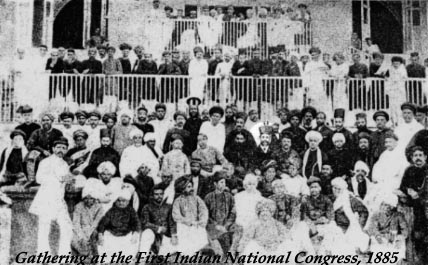 Pherozshah
Mehta was nominated to the Mumbai Legislative Council in 1887 and elected to the
Imperial Council by the Mumbai Legislature in 1893. His fiery orations spiced
with caustic comments and biting sarcasm at all times commanded respect and
undivided attention from friend and foe alike. In the Councils he was, for all
practical purposes, the 'Leader of the Opposition'. But endowed though he was
with burning eloquence and vital force he never abused his gifts to embarrass
the Government. This evoked from
Lord Willingdon the remarks: “a strong and resourceful opponent if he thought
we were wrong, a warm and loyal supporter if he thought we were right, a
fearless critic in his public life".. So great was his hold on the House
that a roar from this Lion of debate or a sparkle in his fiery eyes was enough
to deplete the ranks of his opponents. Pherozshah
Mehta was nominated to the Mumbai Legislative Council in 1887 and elected to the
Imperial Council by the Mumbai Legislature in 1893. His fiery orations spiced
with caustic comments and biting sarcasm at all times commanded respect and
undivided attention from friend and foe alike. In the Councils he was, for all
practical purposes, the 'Leader of the Opposition'. But endowed though he was
with burning eloquence and vital force he never abused his gifts to embarrass
the Government. This evoked from
Lord Willingdon the remarks: “a strong and resourceful opponent if he thought
we were wrong, a warm and loyal supporter if he thought we were right, a
fearless critic in his public life".. So great was his hold on the House
that a roar from this Lion of debate or a sparkle in his fiery eyes was enough
to deplete the ranks of his opponents.
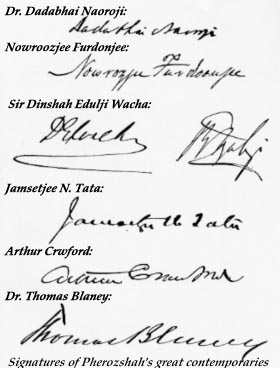 During
his gubernatorial regime, Lord Willingdon leaned heavily on Sir Pherozshah's
sage and sober counsels and by appointing him Vice Chancellor entrusted him with
the task of running the University of Mumbai, whose brightest alumnus he had
been for four decades. During
his gubernatorial regime, Lord Willingdon leaned heavily on Sir Pherozshah's
sage and sober counsels and by appointing him Vice Chancellor entrusted him with
the task of running the University of Mumbai, whose brightest alumnus he had
been for four decades.
A
genuine Swadeshite, Sir Pherozshah Mehta firmly believed that great as the
contribution of politics and education had been, greater still would be the part
commerce and industry had to play in the emancipation of our motherland. The
present lofty position of the Central Bank of India is in no small measure due
to the infinite care with which he nurtured this tender sapling and saw it grow
into a mighty oak. One of his last acts of public service was the establishment
of an English daily, The Mumbai Chronicle, which, like the Bank he had founded,
was entirely staffed, managed, and owned by Indians.
Having
attained the allotted span of three score years and ten he breathed his last on
5th November 1915. The whole country was shocked to hear of the sad news. Men
who had occasion to cross swords in debate with the doughty warrior were the
first "to weep the loss of India's greatest patriot”.
At a condolence meeting in Mumbai it was resolved to raise a fund to
perpetuate his memory. The sum
collected was mainly utilized in erecting an imposing statue which fittingly
stands before his monumental creation - the Mumbai Municipal Corporation.
On its pedestal is engraved Lord Hardinge's memorable epitaph: "A
great Parsi, a great citizen, a great patriot and a great Indian".
The
picturesque Hanging Gardens atop Malabar Hill and a main thoroughfare, which
happens to be the commercial hub of Mumbai, have both been named after him.
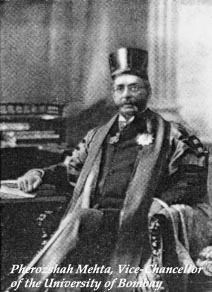 In
vastness of vision and profoundness of intellect Sir Pherozshah remains
unsurpassed. His uncanny judgment, inflexible resolve, boundless energy and
magnetic personality brought him nation-wide recognition in his own time and
legendary fame on his passing away into the 'Great Beyond'. In
vastness of vision and profoundness of intellect Sir Pherozshah remains
unsurpassed. His uncanny judgment, inflexible resolve, boundless energy and
magnetic personality brought him nation-wide recognition in his own time and
legendary fame on his passing away into the 'Great Beyond'.
|